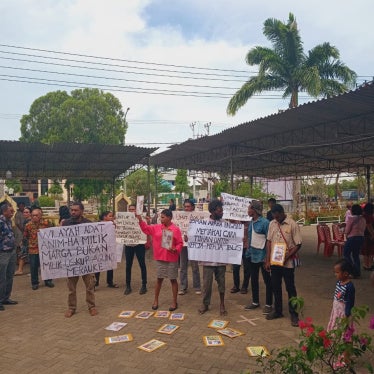Exactly three years ago, on 6 February 2011, some 1,500 Islamist militants stormed the Ahmadiyah community in Cikeusik village in western Java. In this exceptionally brutal assault, which was captured on video, the attackers beat three Ahmadiyah men to death and seriously injured five others. Gruesome footage of the violence circulated widely on the internet, shocking Indonesians and the world. Police ultimately used the video evidence to identify several perpetrators, 12 of whom were convicted but given lenient sentences from three to six months’ imprisonment.
Neighbouring governments like Australia have good reason for concern about the Indonesian government’s apparently inability or unwillingness to protect the Ahmadiyah, a Muslim sect, and other religious minorities from bigoted thugs who act with apparent impunity.
Two weeks ago, a survivor of that horrific attack, Acmad Masihuddin, accompanied me to visit several Ahmadiyah communities in the hills outside Jakarta. Masihuddin told me how that fateful day he tried to run away. Members of the mob caught him and dragged him back, stripping him to his underwear, and beat him with a hoe and machete, until a police officer pronounced him dead and put him in the back of a police van – saving his life.
Masihuddin, whose injuries required two years of treatment, still suffers from headaches and lost partial sight in one of his eyes. Now he works for one of Indonesia’s leading human rights groups, Kontras, to support victims of religious violence. Masihuddin told me, “I am working for Kontras, because I want to stop this from happening again.”
Three years after what should have been Indonesia’s wake up call to address religious violence, the Ahmadiyah and the country’s other religious minorities are under threat.
Across Indonesia, there are multiplying incidents of harassment, threats and violence against religious minorities including several Christian groups, Shia and the Ahmadiyah. These groups have become targets of Islamist militant groups who label most non-Muslims as “infidels,” and Muslims who do not adhere to Sunni orthodoxy as “blasphemers.” Even Indonesia’s atheists live in fear of such groups.
Islamist militants have increasingly and often violently attacked Ahmadiyah since 2005 when Indonesia’s Ulama council, the MUI (Majelis Ulama Indonesia), declared a fatwa, or religious edict, ruling that the Ahmadiyah community deviated from Qur'anic teachings. In 2008, the government passed a nationwide anti-Ahmadiyah decree than bans the Ahmadiyah from proselytising their faith. The government justified this decree on the basis of reducing violence and promoting religious harmony. Instead, the number of attacks has steadily risen and more than 30 towns, regencies and provinces across Indonesia have followed suit, with some outright banning the Ahmadiyah as West Java province has.
I met with representatives of five Ahmadiyah communities in Sukadana, West Java, who described almost daily intimidation, harassment and discrimination, resulting in the closure of three Ahmadiyah mosques by local officials. Ulamas have preached sermons of hate and intolerance over loudspeakers and in some cases, started campaigns to avoid Ahmadiyah-owned businesses. “I get jittery every time I hear the ulamas speaking over the loudspeaker,” an Ahmadiyah woman told me.
Some Ahmadiyah have found it difficult to find jobs. Several men described bureaucratic hurdles when dealing with local officials or requesting new identification documents or building permits. Some Ahmadiyah teachers have been pressured to convert to Sunni Islam or transferred to remote schools when they resisted. Ahmadiyah children have also been bullied by classmates and teachers have pressured them to denounce their “heretical” religious views. Even hospitals are unwilling to accept Ahmadiyah blood, with one woman telling me, “We try to donate blood and we are refused, they say we don’t want Ahmadiyah blood. Only if it’s an emergency, then they come here and ask us.”
This sweeping ostracization of the Ahmadiyah is more insidious than the brutal violence of the Cikeusik attack, and just as dangerous.
Islamists have been emboldened by the success in repressing the Ahmadiyah and are also turning their attention to other minority groups, like the Shia, Bahai and Christians. A 2006 decree that requires religious groups to get permission from a significant number of community members before building a house of worship has been used to shut down not only around 30 Ahmadiyah mosques, but more than 500 Christian churches and several Buddhist temples as well.
Why should Australians care?
A neighbouring country that fails to act decisively in the face of religious violence and facilitates intolerance of other faiths in violation of Indonesia’s own Constitution risks destabilising the region. While Indonesia has done reasonably well in curbing terrorism, its enabling attitude towards intolerant Islamists may create threats which might spill over Indonesia’s borders. Australia does not want to see Indonesia follow the path of Pakistan, where a failure of accountability for violence against religious minorities has led to steady increases in violence against Ahmadiyah, Shia, and Christians.
To curb this trend of intolerance, the Indonesian government needs to act decisively. It can start by revoking discriminatory decrees as well as thoroughly investigating and punishing acts of religious violence. So far, president Susilo Bambang Yudhoyono has claimed he has “no tolerance” for religious violence , yet has he repeatedly failed to back up that promise with action.
Australia and other key governments have leverage and should keep the pressure on Yudhoyono to address religious violence.








